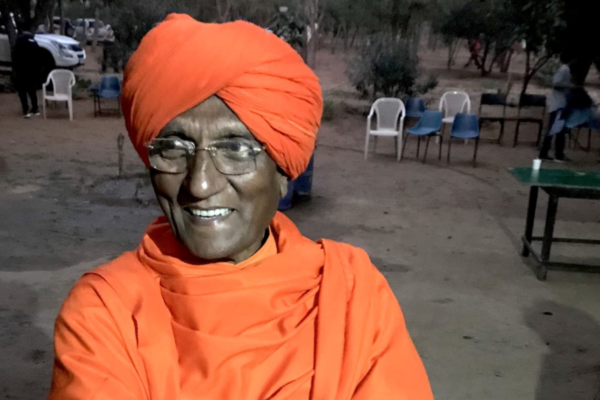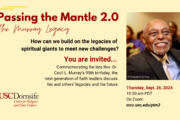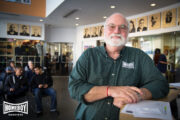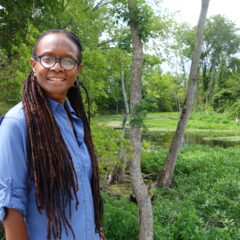This article was originally published in The Christian Science Monitor, with the support of CRCC’s global project on engaged spirituality.
This past November, in a small hamlet in the Indian state of Haryana, several dozen activists from around the country gathered to discuss how to achieve world peace.
The state of affairs was looking grim, with populist movements fanning out across democracies. And in India too, the largest minority group, Muslims, was being demonized by a rising Hindu right.
Vasudhaiva Kutumbakam, the activists called their meeting – the ancient Sanskrit adage meaning “the world is one family.”
The group was convened by Swami Agnivesh, a Hindu monk clothed head-to-toe in saffron, who is also a renowned social activist. At 80, the swami (meaning one who has control over the “self”) is a truly eclectic figure – clothed and steeped in tradition, yet defiant of it in many ways.
“The real seekers were the prophets, not priests,” Mr. Agnivesh tells me, perched on a hard, rustic cot in a room empty apart from the bare essentials – the cot, some towels, a few identical saffron robes, a chair, and a table strewn with books. There is no air conditioning for the sweltering hot months, no heat or hot water for the cold months that sweep through northern India.
“The priest is a follower and the prophet is a rebel and revolutionary,” Mr. Agnivesh continues. “That’s what attracted me to this path – the prophet and the revolutionary character.”
Over the years, Mr. Agnivesh has been many things: an anti-corruption activist, a prisoner, and a politician. He’s negotiated with Maoist rebels, campaigned against sex-selective abortion, and headed the World Council of Arya Samaj, a Hindu reformist movement. But he’s best known for his work for interfaith tolerance, and his organization Bandhua Mukti Morcha (BMM), or the Bonded Labour Liberation Front.
Nearly 8 million people are thought to live in modern slavery in India today, according to the Global Slavery Index. Bonded labor has been outlawed for decades, but the practice persists in industries like brick kilns, quarries, and carpet factories. Many victims are children, and lower-caste Hindus, whose families are trapped by debt. Through BMM, Mr. Agnivesh and fellow activists say they have released more than 200,000 workers and helped to rehabilitate them. Three times, he has served as chair of the United Nations Voluntary Trust Fund on Contemporary Forms of Slavery.
A personal journey
The monk’s spiritual life feeds his political and social rebellion – each one a long process of transformation.
Born Vepa Shyam Rao into an upper-caste Brahmin family from southern India, Mr. Agnivesh grew up following traditional Hindu rituals. While attending college in Kolkata, he discovered the Arya Samaj movement, which emphasizes the ancient Vedas, the oldest scriptures in Hinduism, over later traditions. It “was all very universal, very transformative,” he recalls.
What he calls his “inner evolution” continued as he taught at Kolkata’s St. Xavier’s College, where he worked alongside Jesuits. “I was very critical of Christian missionaries. I’d accuse them of trying to convert our poor tribal people and try to instigate a Christian state here,” he says. Yet his views shifted as he got a glimpse of their simple way of life: “A small bed. Minimal eating.”
“These people worked here in the dust and pollution, whereas I was wondering if I should leave this country and lead a good comfortable life in the U.S.? No!” Mr. Agnivesh says. “I asked myself what my mission was and realized I had none. So I decided, even though I am not a missionary, I must have a mission.” This was the moment, Mr. Agnivesh recalls, that he decided to become a monk.
Yet he also made a name for himself in Haryana’s politics, and was even jailed – along with much of the opposition – by Prime Minister Indira Gandhi during the two-year “Emergency” in the 1970s, remembered for its civil liberties abuses. Afterward, he was elected to the state legislature and became minister for education. But he soon quit and threw himself full time into freeing bonded workers, founding the BMM in 1981.
Much of his activism has focused on tolerance, at a time when there is fear both inside and outside India that religious freedom is diminishing sharply, particularly for Muslims. In May, the U.S. Commission on International Religious Freedom designated India a country “of particular concern,” noting “government action … created a culture of impunity for nationwide campaigns of harassment and violence against religious minorities.” For years, Mr. Agnivesh has led efforts to defuse tension after Hindu-Muslim clashes, and denounce leadership he considers responsible for failing to halt attacks – including that of current Prime Minister Narendra Modi.
But tolerance within a faith, his advocacy underscores, is just as important as tolerance between them. For decades, he has led campaigns to change practices within Hindu culture that he sees as unequal toward women or Dalits, the people lowest in the caste hierarchy, such as his effort to secure the entry of so-called untouchables into Hindu temples.
What next?
As much as Mr. Agnivesh’s career is multifaceted, his lifestyle is simple. The monk does not own property and has little money in the bank. Yet he has inspired social workers and activists of all ilks in India. Manohar Manav, a local activist from the state of Bihar, spent 10 years as the swami’s pupil. Also born into an upper-caste family, Mr. Manav says he was compelled to drop his last name – a signifier of one’s caste – after hearing the swami speak. He adopted the caste-agnostic title Manav, which literally means “human.”
“When a person rises from religion towards spirituality, he situates himself in a bigger striving,” says Mr. Manav, who is now director of the BMM. “Then there is no Hindu, Muslim, Sikh, Buddhist, or Christian. This vision was given to me by Swamiji.”
Frequently, the monk has come under attack from a resurgent right-wing Hindu nationalist movement, opposed to his criticisms of what he considers “dogmatic” practices – and his visible work on Hindu-Muslim solidarity, at a time when many gurus seem to endorse the ruling party’s “Hindutva” ideology. In 2018, as he was working with marginalized communities in the eastern state of Jharkhand, groups affiliated with the ruling party protested against him, and a mob assaulted him, hitting him until he fell into a lump on the ground. The assailants accused him of being sympathetic to Christian missionaries and proselytizing to local tribes.
But fear is not a factor for the monk, he says. “I am a threat because I am showing them a mirror,” he says. “I am telling them that the religion or gods of Hinduism that you are talking about is not this; you are perverting and corrupting it. You are bringing shame on Hinduism.”
Eventually, he shares the concern that bites him the most.
“Sometimes, I feel, who will take my work forward? I am not completely sure about that,” he says. So, should he have designated a successor? “No, I have seen that no prophet’s children have truly taken their work forward. No one has.”
Click here to read the article on csmonitor.com.
Soumya Shankar is a journalist fellow with the Spiritual Exemplars Project.










